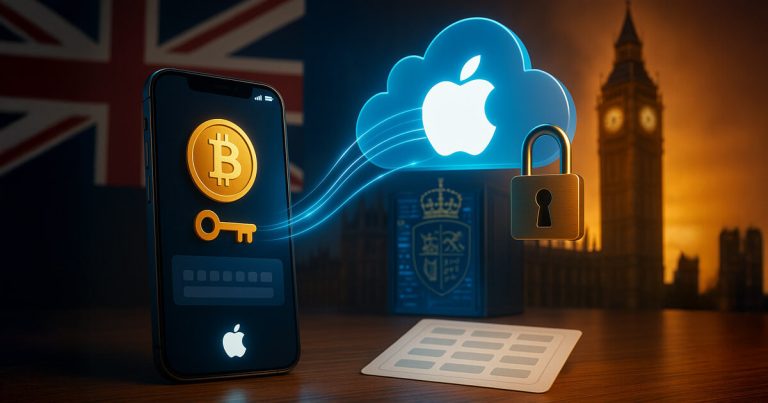The United Kingdom is weighing measures that could compel Apple to provide access to some iCloud data, raising a precise question for crypto users who keep wallets on iPhones and Macs.
If device backups and common file stores lose end-to-end protections in the UK, seed phrases and private key material can more easily move from a user’s device into locations where lawful process, or a Technical Capability Notice, can reach them.
UK authorities issued a renewed Technical Capability Notice to Apple focused on iCloud access for UK accounts. Apple has not commented on that order.
The Home Office has not commented on individual notices, which are secret by design. In February, Apple withdrew Advanced Data Protection for UK users, a setting that otherwise extends end-to-end encryption to categories such as device backups, iCloud Drive, Photos, and Notes.
iCloud Keychain remains end-to-end encrypted by default, and Apple says it has never built a backdoor for its products.
That split matters because crypto wallets do not live only inside iCloud Keychain.
Users frequently produce screenshots of seed phrases and store them in Photos, jot down recovery words in Notes, or leave wallet app data inside a device backup. When Advanced Data Protection is unavailable, those categories revert to Apple-held keys, which can be decrypted after authentication or under a lawful order.
The UK change does not affect iCloud Keychain; however, content outside Keychain is. Historical cases show real losses when wallet vaults written to iCloud backups were phished and drained, including incidents tied to MetaMask advisories.
Apple details how backup protection works in its iCloud Backup security overview and describes Keychain protections in the Keychain security overview. The broader Advanced Data Protection page outlines which categories receive end-to-end encryption when the feature is available.
Policy timing creates a near-term window where wallet risk shifts without changing Bitcoin or Ethereum protocols. The Online Safety Act codes of practice empower Ofcom to propose and accredit technology measures, including client-side scanning approaches, and to oversee how services comply.
Consultations during 2025 covered additional safety measures and potential technology notices. While the details of any new UK mandate remain confidential until implemented, the regulatory direction is clear enough for users and developers to update their threat models now.
A straightforward way to size the exposure is to estimate the UK pool of iPhone users whose content relies on Apple-held keys. Using the Office for National Statistics mid-2024 population estimate of about 69.3 million, a smartphone penetration band of 90 to 95 percent drawn from DataReportal and Ofcom context, an iOS share band of 45 to 55 percent, and an assumption that 60 to 75 percent of iPhone users enable iCloud storage or backups, the addressable pool sits in the tens of millions.
The ranges below are illustrative and should be presented as ranges, not a point forecast.
Those users are not all at risk of wallet loss; however, the pool frames the magnitude of the risk if Apple-held keys and a UK-only access path coexist.
A stress test helps anchor the discussion.
If 1 to 3 basis points of that pool were compromised over a year through a blend of lawful access abuse, social engineering after data disclosure, or targeted account recovery attacks that succeed because more content is decryptable, the count lands between roughly 1,700 and 8,000 users.
With median hot-wallet balances in a conservative $2,000 to $10,000 band, direct losses could total $3 million to $80 million. The math does not argue inevitability, but it clarifies order of magnitude and how incentives change if backups and common file stores are not end-to-end encrypted.
The channel through which keys leak is as significant as the policy question.
iCloud Keychain remains end-to-end encrypted, so passwords and passkeys stored there are not a soft spot. The weak points appear where users choose convenience over compartmentalization. Photos and Notes, without Advanced Data Protection, are decryptable by Apple.
App data left in iCloud Backup is decryptable by Apple. Optional cloud backup features built into some wallets, including Coinbase Wallet documentation, that describes an opt-in recovery phrase backup, depend on the strength of the user’s passphrase and the provider’s implementation, and they inherit any change in the surrounding cloud threat surface.
According to Apple’s materials, secrets should live in the Secure Enclave with appropriate access control, and developers can mark files to exclude them from iCloud Backup.
Three scenarios help clarify how the next 12 to 18 months could unfold.
First, a UK-only carve-out persists, with Apple maintaining Apple-held keys for backups and common stores and adjusting internal processes to meet any renewed notice. Wallet risk for retail users stays elevated where seeds intersect those stores.
Second, Advanced Data Protection returns to the UK, either after legal or political reversals, and the risk reverts to the global baseline of phishing, device theft, and commodity infostealers.
Third, Ofcom-accredited client-side scanning expands on the device before encryption, framed as a measure that avoids formal key escrow. This debate mirrors the European Union’s ongoing discussion over chat scanning.
That path still increases the attack surface since new scanning code paths and review APIs become targets, and it normalizes inspection of device content that previously remained opaque to the service.
Developers have a narrow set of controls that reduce exposure regardless of policy.
The practical steps are to keep seed material out of any cloud-synced store, tag secrets and vaults with do-not-backup attributes, rely on the Secure Enclave for key protection, and require high-cost key-derivation settings for any optional cloud backup features so that weak passphrases are rejected.
Users have a parallel path: move seed storage off the device and off the cloud entirely, avoid screenshots and notes for recovery words, and harden Apple ID recovery and two-factor authentication since account takeover becomes more valuable when more cloud data is decryptable.
According to Coinbase Wallet guidance, the cloud backup is opt-in and encrypted with a user-chosen password, which puts responsibility on password quality if users choose the feature.
The broader market context helps explain why a UK policy change resonates outside the UK.
Apple and Google control the mobile stack for nearly all users, so a jurisdictional carve-out applied to a major platform creates both a code path and a precedent.
Australia’s Assistance and Access Act and India’s Section 69 authorities show how targeted orders gain scope over time. The European Union’s debate over client-side scanning, often labeled chat control, shows the struggle to square safety goals with end-to-end encryption.
Even if a UK notice binds only UK accounts, any engineering to route around encryption in one place increases pressure to replicate the outcome elsewhere and invites adversaries to study the new path.
Apple’s public position remains that it does not build backdoors, and its documentation lists data categories that stay end-to-end encrypted.
Per Apple’s statements, iMessage and FaceTime continue to use end-to-end encryption, and iCloud Keychain continues to protect secrets at rest.
The question for crypto users is not whether Apple will turn off end-to-end encryption everywhere, it is whether commonly used storage categories that sit outside Keychain, and the lawful processes that govern them, create a practical path to wallet compromise if seeds or key material ever touch those locations.
The near-term facts are straightforward.
The UK has renewed a secret order seeking access to iCloud data for UK users. Apple withdrew Advanced Data Protection for new UK users in February.
It has detailed which categories remain end-to-end encrypted in its UK support notice and the Advanced Data Protection documentation.
Ofcom is still refining how the Online Safety Act will be enforced and how proactive technology measures will be accredited and applied.
Those facts are enough to build clear threat models and to quantify the exposure ranges.
What happens next depends on whether the UK mandates methods that reach around encryption or restores end-to-end coverage to backups, Photos, Notes, and other high-leverage stores.



